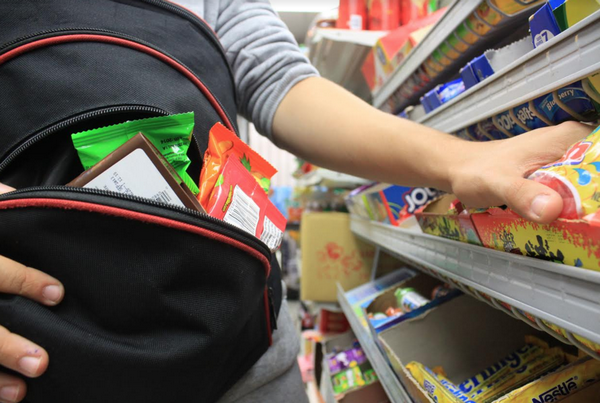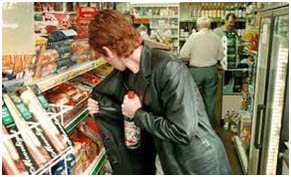Life and Times – A bit of your own back?
 Someone I’ve known for a long time recently surprised me. He told me he was a shoplifter – a regular one. I say he surprised me because he’s got a regular job and it shouldn’t be something he needs to do to make ends meet. So why does he do it? ‘I’m just getting a bit of my own back’, he told me. What did he mean by that? Well, he explained that, while he had to do a job he didn’t particularly like to keep his head above water, those ‘damned shareholders’ were raking it in for doing nothing. ‘Legalised theft’, he called it. But, I objected, didn’t that mean other people who didn’t shoplift were losing out because the shops would just recoup their losses by putting up prices? No, he said. He’d thought and read about that and his conclusion – which actually seemed to make sense to me – was that they couldn’t put their prices up willy-nilly, because they were having to compete with other shops and stores as well as online retailers and would risk losing customers if their prices were higher than their competitors. It might affect their profitability a bit and their shareholders’ dividends, he said, but he didn’t care about that. So, he insisted, those who said he was penalising ‘honest’ shoppers were advancing spurious arguments.
Someone I’ve known for a long time recently surprised me. He told me he was a shoplifter – a regular one. I say he surprised me because he’s got a regular job and it shouldn’t be something he needs to do to make ends meet. So why does he do it? ‘I’m just getting a bit of my own back’, he told me. What did he mean by that? Well, he explained that, while he had to do a job he didn’t particularly like to keep his head above water, those ‘damned shareholders’ were raking it in for doing nothing. ‘Legalised theft’, he called it. But, I objected, didn’t that mean other people who didn’t shoplift were losing out because the shops would just recoup their losses by putting up prices? No, he said. He’d thought and read about that and his conclusion – which actually seemed to make sense to me – was that they couldn’t put their prices up willy-nilly, because they were having to compete with other shops and stores as well as online retailers and would risk losing customers if their prices were higher than their competitors. It might affect their profitability a bit and their shareholders’ dividends, he said, but he didn’t care about that. So, he insisted, those who said he was penalising ‘honest’ shoppers were advancing spurious arguments.
He also explained that he didn’t shoplift from small shops, since that wouldn’t be fair. Most small shopkeepers, he said, were struggling to make a living and having stuff stolen from them would likely push them over the edge. In fact he told me he despised people who stole from small shops, since it was just poor people stealing from one another.
Trouble in store
What to make of all this? Well, I had a look into it myself and discovered that in recent times there has been what I saw described in one report as an ‘explosion’ in shoplifting. Figures issued by the British Retail Consortium showed thefts across the sector in England and Wales had risen by 26 percent in 2022. In an online article entitled ‘The cost of living started my shoplifting: why stealing goods is on the rise’, BBC business editor Ez Roberts interviewed a number of self-confessed shoplifters and concluded that, while many of them did it because they couldn’t afford food, others who could manage financially just saw it as an easy way to get something for nothing. And easy it is apparently, since, according to a supermarket manager interviewed, ‘little can be done about it’. ‘If staff intervene’, he said, ‘it can lead to violence’. He added that it was hard to get the police to come. ‘We don’t call the police anymore’, he said. ‘They won’t come. Unless the thief has stolen around £500 worth of items the police aren’t interested.’ But police obviously do turn up – sometimes – since their figures from March this year, the most recent available, show forces recording almost 33,000 incidents of shoplifting.
Too many offenders
Having said that, this is obviously only a tiny proportion of all the shoplifting that takes place. Most offenders ‘get away with it’, and even when they do come onto the police radar, they are unlikely to be prosecuted – and increasingly so. That’s because recent reports have shown that the potential prison population is growing faster than the jail cells and other space available, and the knock-on effects of this are that sentences are getting shorter, fewer people found guilty are being sent to prison and fewer people are actually being prosecuted. An increasing number are being given cautions, even for relatively serious offences. In these circumstances, therefore, it looks increasingly unlikely that shoplifters caught by police will get anything more than a ticking off.
The surge
As for the recent surge in shoplifting, though it’s mainly due to the rise in the cost of living and the inability of many people, even those with regular employment, to make ends meet, it seems also to be the case that at least some of the increase is not down to desperate hard-up individuals but to other factors – in particular the sense of insecurity even among those who have a steady income. It will always be a temptation to people living from one pay cheque to the next to steal to make that cheque go further. And then of course there’s the acquisitive ethic the system we live in imbues people with. An example of this came from the BBC report where an Oxford University student interviewed said she shoplifted because she wanted to use her own money to buy the more expensive products her fellow students were able to get.
Disobedience
There are of course other causes too, for example the need of some individuals to obtain drugs or alcohol and also the fact that an increasing number of people feel less intimidated by the ‘rules’ of private property society and the authority it seeks to exercise.
 Unfortunately, while disobedience to the authority of the private property system by the act of shoplifting may give some personal satisfaction to individuals, it is not a particularly positive or constructive way to help do away with that system and replace it with another one in which the stores of the world can be made freely available to them – and to everyone.
Unfortunately, while disobedience to the authority of the private property system by the act of shoplifting may give some personal satisfaction to individuals, it is not a particularly positive or constructive way to help do away with that system and replace it with another one in which the stores of the world can be made freely available to them – and to everyone.
HOWARD MOSS
